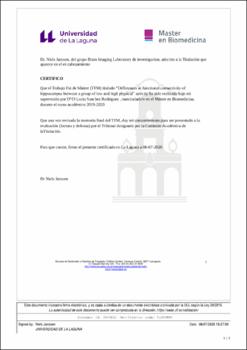Differences in functional connectivity of hippocampus between a group of low and high physical activity
Author
Sánchez Rodríguez, LuciaDate
2021Abstract
Physical activity (PA) has been considered an important part of a healthy lifestyle
due to the positive influence on an individual’s health. The physical benefits that we could
obtain from an active lifestyle are well-known and also, an overall wellbeing. Recent
studies have focused on the underlying changes in brain structure and function to explain
the benefits in cognition and mental health. To understand these changes, many studies are
done with rodents, using techniques normally invasive or applied to measure molecular or
cellular changes in the brain, obtaining micro-scale findings difficult to demonstrate in
vivo human studies. In this study, we focused on a brain structure called the hippocampus
in order to observe the functional differences in human brain influenced by PA during
work compared to PA during leisure time. To do that, we used fMRI to detect blood flow
differences between these two groups. Our results point to consider PA in work is related
to greater left hippocampal activity than participants with low PA in work. The main point
of our study is the possible of stimulating newborn cells, known as neurogenesis,
challenging us to think on PA as a possible treatment to Alzheimer’s disease in a
multidomain intervention and also as a part of a lifestyle that could contribute to healthy
aging La actividad física ha sido considerada una parte importante de un estilo de vida
saludable debido su influencia en la preservación del bienestar físico y mental. En la
actualidad se conocen los beneficios físicos a corto y largo plazo en las personas que
tienen un estilo de vida activo, pero lo que aún se trata de comprender son los cambios en
el cerebro a nivel estructural y funcional para explicar los beneficios en cognición y salud
mental. Para entender dichos cambios, muchos estudios han sido realizados con roedores,
utilizando técnicas normalmente invasivas o aplicadas para medir cambios moleculares o
celulares en el cerebro, obteniendo resultados que son difíciles de obtener en estudios in
vivo. En el presente trabajo, nos hemos centrado en el hipocampo para observar
diferencias a nivel funcional en el cerebro humano, utilizando un grupo de actividad física
en el trabajo y actividad física durante el tiempo libre. Para ello, hemos utilizado fMRI
para detectar diferencias a nivel vascular entre los dos grupos. Nuestros resultados apuntan
a que la actividad física durante el trabajo genera cambios en la actividad del hipocampo
izquierdo, en comparación con aquellas personas que sólo realizaban actividad física
durante el tiempo libre. Esto nos puede llevar a plantear la posibilidad de estimular la
neurogénesis, o nacimiento de nuevas células, a partir de tratamientos multimodales,
donde se incluya la actividad física en tratamientos de enfermedades neurodegenerativas y
reforzar la idea de que un estilo de vida saludable puede contribuir a un envejecimiento
sano.




